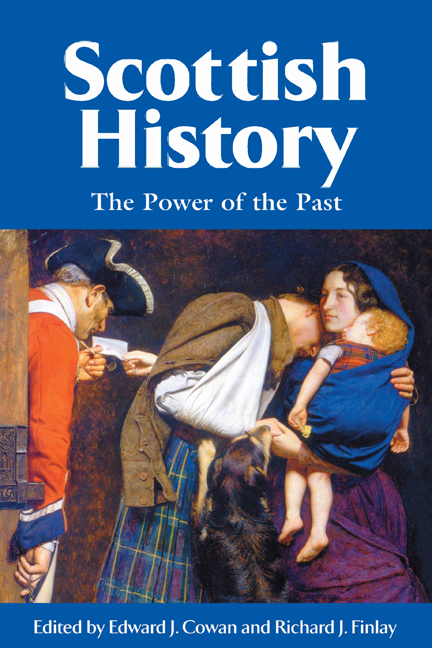Book contents
- Frontmatter
- Contents
- Contributors
- Introduction
- 1 The Picts‘ Place in the Kingship's Past Before John of Fordun
- 2 The Demonisation of King John
- 3 Late Medieval Scotland and the Matter of Britain
- 4 In Search of the Scottish Reformation
- 5 Civil Society and the Celts: Hector Boece, George Buchanan and the Ancient Scottish Past
- 6 The Covenanting Tradition in Scottish History
- 7 ‘What's in a Name?’: Pedigree and Propaganda in Seventeenth-Century Scotland
- 8 The Ideological Uses of the Picts, 1707-c.1990
- 9 The Jacobite Cult
- 10 Queen Victoria and the Cult of Scottish Monarchy
- 11 ‘Their Laurels Wither'd, and their Name Forgot’: Women and the Scottish Radical Tradition
- 12 Tomorrow's Ancestors: Nationalism, Identity and History
- Index
10 - Queen Victoria and the Cult of Scottish Monarchy
Published online by Cambridge University Press: 24 September 2020
- Frontmatter
- Contents
- Contributors
- Introduction
- 1 The Picts‘ Place in the Kingship's Past Before John of Fordun
- 2 The Demonisation of King John
- 3 Late Medieval Scotland and the Matter of Britain
- 4 In Search of the Scottish Reformation
- 5 Civil Society and the Celts: Hector Boece, George Buchanan and the Ancient Scottish Past
- 6 The Covenanting Tradition in Scottish History
- 7 ‘What's in a Name?’: Pedigree and Propaganda in Seventeenth-Century Scotland
- 8 The Ideological Uses of the Picts, 1707-c.1990
- 9 The Jacobite Cult
- 10 Queen Victoria and the Cult of Scottish Monarchy
- 11 ‘Their Laurels Wither'd, and their Name Forgot’: Women and the Scottish Radical Tradition
- 12 Tomorrow's Ancestors: Nationalism, Identity and History
- Index
Summary
Historians of modern Britain have long recognised the cultural, social and political significance of the monarchy. Indeed, as the institution was modernised and updated, it came to play an increasingly important symbolic role in defining Britain and its imperial identity in the Victorian era. As the apparent political power of Victoria diminished as Britain ambled on its way towards greater democracy, her symbolic power increased. The use of the monarchy as a symbol of British power and prestige is perhaps one of the most popular and enduring cultural icons of the Victorian era. Victoria, whether as the middle-class embodiment of the ‘mother’ of the nation or the altogether more resplendent Empress of India, was largely omnipresent in British society (apart for a prolonged period of mourning for the death of Albert in 1861). David Cannadine has noted how the institution of the monarchy was reinvented to accommodate the greater symbolic demands of Victorian Britain. Yet, historians of Scotland have not focused on the effect of this most potent British cultural symbol, which, along with parliament and the military, combined to produce a ‘holy trinity’ of British institutions which could arguably match and balance the Scottish institutions of law, religion and education to produce a reasonably harmonious Scottish/British identity in Scotland. While politics and the military are increasingly receiving historical attention, the monarchy has been strangely absent from Scottish historical enquiry in the British era. This is a situation which is all the more strange given the tendency to focus on Scottish notions of kingship and Jacobitism during the first half-century of the Union with England. Indeed, more work has gone into charting the activities of the remnants of Stewart loyalism in Scotland in the nineteenth century than has been carried out on the activities of the British monarchy in Scotland. After 1746 monarchy vanishes from the Scottish historical record with only minor appearances thereafter. Without the Stewarts, it would appear, monarchy has no place in Scottish history, other than to denounce the phoniness of ‘Balmoralism’.
- Type
- Chapter
- Information
- Scottish HistoryThe Power of the Past, pp. 209 - 224Publisher: Edinburgh University PressPrint publication year: 2020



